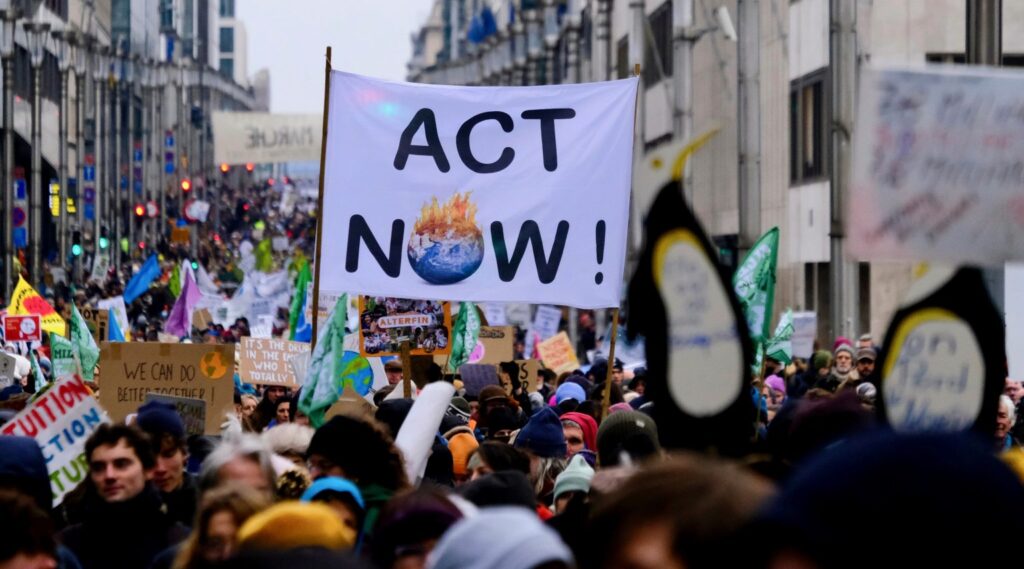Opinion: COP28 and the Climate Bomb on Binden’s Desk

Climate protest in Brussels urging action at COP28. Photo: Alexandros Michailidis, via Shutterstock
Love, Justice and Climate Change

It’s been very interesting to read various commentators’ reactions to COP28, the UN climate conference of all the nations that met in Dubai for two weeks in December. Some are describing it as a dismal failure, while others see it as a positive turning point in human history. Paradoxically, I think both views are correct.
COP28 utterly failed to do what humanity needs in order to deal with the climate emergency. What we needed was ambitious, enforceable commitments to begin immediately to phase out fossil fuel use and extraction in every nation, and for the nations that got wealthy burning fossil fuels to provide financial assistance to the developing nations so they can deal with climate change.
Fossil Fuel Industry and Petrostates Block Progress
Of course, we got none of this from the COP. It’s not surprising that the COP didn’t take these actions. Over 2,400 fossil fuel industry representatives and lobbyists were at the COP, working constantly to thwart any decisions that might limit their industry. Furthermore, the COP process requires unanimous agreement among the almost 200 nations on the final conference statement.
Obviously, bold statements calling for real climate action are not possible when petrostates like Saudi Arabia and Russia must agree. Because of the power of the fossil fuel industry and the petrostates, no COP agreement has ever even mentioned fossil fuels, despite everyone knowing that they are the biggest cause of climate change.
Global South Nations Lead the Way to Change
Part-way through the two-week COP28 some 130 nations were calling for including a “phase out” of fossil fuels in the final agreement. Oil and gas producing nations were strongly opposed and seemed to be in control. After considerable uproar, the conference stayed in session past its scheduled end and under intense pressure from the small island nations and others eventually came to agreement to call for:
“… transitioning away from fossil fuels in energy systems, in a just, orderly and equitable manner, accelerating action in this critical decade, so as to achieve net zero by 2050 in keeping with the science.”
Critics noted that “transitioning away” is not as strong as “phasing out”. They also pointed out what they called a “litany of loopholes” that are included in the final conference statement. The loopholes include support for continuing to burn “transitional fuels”–code words for fossil gas. There’s also mention of carbon capture–a technology that does not exist in a way that will affect climate change–often promoted by the oil and gas industry to supposedly rationalize their continued expansion of deadly fossil fuel extraction.
What Can We Do with the COP Statement on “Transitioning away?”
Nonetheless, a COP has finally acknowledged what we’ve all known–humanity must stop extracting and burning fossil fuels. For now, these are just words on a page. They don’t mean anything until we see what we can make happen with them.
In 2015, at COP21 in Paris, the conference was about to agree to set limiting global warming to 2°C as the target, when island nations and other vulnerable nations insisted that 1.5°C needed to be the target. At the last minute the conference agreed to seek to “hold global temperature increase to well below 2°C above pre-industrial levels and pursue efforts to limit it to 1.5°C.” Activists, scientists, and some political leaders seized on the 1.5°C limit and have made it the focus of advocacy, scientific work, and goal-setting ever since. We probably won’t succeed in staying below 1.5°C, but having that as a major focus and target for the last eight years has made a huge difference.
Similarly, if the climate movement in every country in the world can now take that phrase “transitioning away from fossil fuels in energy systems, in a just, orderly and equitable manner,” and make it the focus of every policy decision and goal, and build widespread support for making it happen now, this COP could yet be a turning point in the history of humanity’s efforts to avoid our planet becoming uninhabitable.
A “Climate Bomb” in the U.S.
One of our first chances to try to make the statement mean something is in the U.S. The Biden Administration is facing a decision of whether or not to approve permits to allow the industry to build more LNG export terminals on the Louisiana Gulf coast. It’s like a climate bomb sitting on Biden’s desk. More terminals will mean more drilling and export of fossil gas and more burning of fossil gas around the world. If this happens it will be a disaster for the climate. The industry is proposing some 17 additional terminals–the largest fossil fuel expansion in the world.
The U.S. signed the COP28 statement about “transitioning away from fossil fuels…accelerating action in this critical decade.” To permit any more LNG terminals would be horrific hypocrisy and damage the Administration’s credibility with the world and with voters in the U.S. An uproar of opposition to permitting these terminals is growing. Please add your voice!
If you haven’t yet signed the petition calling on President Biden and the Department of Energy to stop the expansion of liquefied natural gas terminals, please sign now. You can also learn more about the effects of these terminals from my earlier post, write letters, and share the information with everyone you know.
The COP is not the game; it’s just the scorecard. What matters is what happens in between the COPs.
Russ Vernon-Jones was principal of Fort River School 1990-2008 and is currently a member of the Steering Committee of Climate Action Now-Western Massachusetts. He blogs regularly on climate justice at www.russvernonjones.org.
